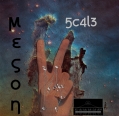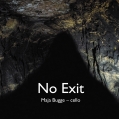95CD - Bo Meson & Martin Archer - 288 / Babel - CD plus download
TweetListen

Bo Meson – voice, software instruments
Wolfgang Seel – voice
Peter Rophone – choral voices
Martin Archer – Bb and bass clarinets, software instruments
Graham Clark – violin
Maja Bugge – cello
Collaborations between poet / composer Bo Meson and composer Martin Archer tend to stray into odd places where neither of them would normally venture, and when they meet up normal rules cease to apply. Quite how the initial idea for this piece, inspired by the odd fact that Matt Damon’s script for the fourth Jason Bourne movie comprised a total of just 288 words, ended up as a metaphysical dialogue between Rasputin and Goethe set to a kind of surrealistic take on a middle-European palm court trio, is frankly anyone’s guess. Nevertheless, the end result, which gives plenty of room for the wonderful improvising skills of Graham Clark and Maja Bugge on violin and cello respectively, plus interludes from Archer’s creepy clarinets, is another fine example of Meson’s poetic exploration of arcane and obsessive detail.
These two compositions for sextet originate from very different sources but share a mode:
The text for 288 represents a rewriting of lines from a specific protagonist caught up in ‘world-historic’ events whose thoughts have been re-arranged into a new narrative here, as they have been misconstrued politically by many since those events… The false dichotomy of Apollonian vs Dionysian is invoked as is the way Nietzsche’s interpretation influenced Mittel-European thought. The premise of 288 is that if Jason Bourne can get away with just 288 words in a film then perhaps anything else, no matter how emotionally complex, might be summarised with a similar number.
A Horizontal Babel originates in poems written whilst considering both the differing exegeses (Jewish & Christian) concerning Genesis xi 1-9 and a colleague’s archaeological work in Hawaii with horizontal stratigraphy.
The title will already have frightened off all those who habitually bleat “Can’t they just play Sweet Sue, It’s You?”, but it’s not meant to be taken altogether seriously. It probably helps to have some idea of what’s being played around with on titles like Cat On A Hot Tin Drum or Deutschland’s Greatest Love Machine, or even (come back John Walters!) Einstein A No No.
I’ve said enough about Martin Archer in recent months (still no cheque in the post) for it to be clear where he and Discus stand in my appreciation of no-boundaries creative music in Britain. The only problem is that there is so much of it and in so many different contexts and forms. The sextet writing here seems to explore the constant tension in improvised (and most other) music between order and freedom. Evoking Goethe (colour?), Fr Grigori (hypnotism?) and Einstein (relativity?) might offer some impression of what the music tries to do, but it will only be partial.
Meson’s vocals are compelling, even if not always clearly intelligible or decodable. Archer limits himself to Bb and bass clarinet on this occasion, though both the composers use software instruments to help shape a sound that is completely sui generis. Strings and chorused voices give it a chamberish effect. I was reminded vaguely of Zyklus here and there, but can’t explain why. The best thing to do is to hear it. The second piece, also in loose suite form, is A Horizontal Babel, apparently inspired by a friend’s work in archaeology, but also Genesis XI, which as all you pilgrims will already know is the bit where divisive language begins to evolve and Babel is constructed. It seems like an appropriate metaphor for music as various as this, though it’s always clear that there is an Ur-speak behind it all, a common pool of understanding that holds the whole thing together.
Great stuff and endlessly entertaining. Oh, by the way, the 288 refers to the number of words, 45 lines of dialogue, spoken by Matt Damon in Jason Bourne. Just in case you were wondering. – Brian Morton, JAZZ JOURNAL https://jazzjournal.co.uk/2020/10/07/meson-archer-288-the-idiolect-twixt-goethe-and-rasputin-a-horizontal-babel/
____________________
Bo Meson is a poet and musician who runs his own collective Meson realizing projects of free form improvisation combined with poetry. His collaborations with Martin Archer and collaborators are of a similar vein and this also counts for their latest effort ‘288/Babel’.....The musical textures are very open and free-form, sometimes reminding me of the chamber music created by Hector Zazou. The prominent role of violin and cello is a pleasure. Both Clark and Bugge create tasteful and inspired patterns. Also, Archer punctuates effectively with his well-proportioned contributions. - Dorf Mulder, VITAL WEEKLY
____________________
This recording consists of two ‘suites’. The first, ‘288: the idiolect twixt Goethe and Rasputin’, of 7 sections, and the second, ‘A horizontal Babel’, of 6 sections. As with many of the more experimental recordings of Discus, the titles of the track provides plenty of fodder for contemplation – with phrases that could be clues in a cryptic crossword (and liner notes that are more than cryptic). So, for example, in the ‘idiolect…’ we have titles like ‘Cat on a hot tin drum’, track 2, (with its slamming together of Tennessee Williams and Gunter Grass) or ‘Deutchland’s greatest love machine?’, track 5 (with its acknowledgement of Boney M). The opening track is entitled ‘Nachtraglichkeit’ which references Sigmund Freud’s theory of ‘afterwardness’ in which the memory of an event can be rewritten in terms of later experiences. And this sets the conceit for the pieces in this suite: a protagonist’s reports of ‘world-historic’ events are re-arranged into new accounts. And, just to add to the word-play, the number ‘288’ refers to the number of words spoken by Matt Damon in the film ‘Jason Bourne’ – which then sets a limit on the number of words spoken through the pieces. Of course, this all sounds wilfully obtuse and cerebral – but it is amusing to listen to the ways in which the words run away with the speakers and the ways in which sense threatens to break out before turning tail. But, equally as with so many of Discus experimental recordings, there is an immediacy to the musical improvisations that make them work on many levels. In particular, the interplay between violin, ‘cello, clarinets, spoken word and electronic manipulations creates patterns in which meanings (both linguistic and musical) are allowed to tumble over each other. Just as the words create the semblance of meaning, so the clarinet and strings create a rolling commentary on these words, sounding as if they are going to evolve into a chamber piece before endlessly stepping off into other directions – but without ever dropping into discordances or ‘experimental’ sounds in that you could be listening to fragments from, say, Ligeti or Part.
The second ‘suite’ starts off, conceptually at least, where ‘288’ ends. That is, it takes it inspiration from Gensis xi 1-9, where the tower of babel is described. And of course, the uses of language to befuddle and obfuscate and confuse is central to this story too. Given that what Christians refer to as the Old Testament forms part of the Torah and the Koran, there are opportunities to reflect on how these words are given different contexts and interpretations. Across these pieces, the violin, ‘cello, clarinet are processed further with more distortion and manipulation than the previous ‘suite’. Together, there are some fine improvisations across both of these 'suites' and the ways in which there is a sort of politics of misunderstanding the piecing together of the verbal and musical segments provides an interesting commentary on the times we live in. - Chris Baber JAZZ VIEWS
https://www.jazzviews.net/bo-meson--martin-archer---288--babel.html
____________________
Mit "288 / Babel" legten Martin Archer und Bo Meson im Sommer 2020 ihr zweites gemeinsames Album vor. Oder, eigentlich ist es das dritte, da Archer auch auf "5C4L3" von Mesons Band Meson zu hören ist. Es ist aber nach "Echoic Enchantment" das zweite, welches unter dem Projektnamen Bo Meson & Martin Archer veröffentlicht wurde.
Stimme und Elektronik gibt es auch auf "288 / Babel" zu hören, dazu Kammermusikklänge erzeugt von Violine, Cello, und Klarinetten. Im Vergleich zu "Echoic Enchantment", auf dem eine ganze Ladung an Gast/Mitmusikern zu hören war, ist hier die Musik etwas sparsamer instrumentiert. Alles in allem wirkt das Gebotene daher etwas zerbrechlicher, aber auch direkter.
Recht viel Text ist auf "288 / Babel" zu hören, rezitierend und eher emotionslos, nicht selten aber effektverfremdet vorgetragen. Dazu erklingt fast gleichberechtig die Musik, doch dominiert Mesons Stimme das Ganze doch deutlicher als auf dem Vorgänger. Wie der Titel des Albums andeutet, sind hier zwei Stücke zu hören, "288" und "Babel". Ich habe versucht zu ergründen worum es hier geht, aber das ist gar nicht so einfach. "288" heißt so, weil Matt Damons Dialogtext im vierten Teil von Jason Bourne genau so viele Worte beinhaltet. Davon inspiriert entstand dann ein metaphysischer Dialog zwischen Goethe und Rasputin (aus 288 Worten?). Das versteht ihr nicht? Ich auch nicht. Es klingt aber ganz cool.
"Babel" (eigentlich "A Horizontal Babel") dagegen wird folgendermaßen vom Künstler beschreiben: "It originates in poems written whilst considering both the differing exegess (Jewish & Christian) concerning Genesis xi 1-9 (there’s no agreement on what’s sinful or otherwise) and a colleague’s archaeological work in Hawaii with horizontal stratigraphy". Hm ... ich lasse das mal unkommentiert stehen.
Wie bei den anderen beiden schon erwähnten Meson Werken ist es auch hier wohl besser nicht weiter nach einer Botschaft zu suchen (oder sich über eine solche den Kopf zu zerbrechen), sondern die Klänge als eine Art Gesamtkunstwerk aus Stimme und Tönen zu goutieren, als ein bizarres Klanggebilde aus Gedichtvortrag (in "288" oft auch von Wolfgang Seel in Deutsch), Elektronik und Kammermusik. Also, progressiv ist das sicher, bisweilen auch ziemlich beeindruckend und hypnotisch gefangen nehmend (insbesondere in "A Horizontal Babel"), nicht selten aber auch ein wenig anstrengend.
"288 / Babel" biete alles in allem originelle Musik, aber im Vergleich zum Vorgänger ist mir hier der Textanteil etwas zu hoch. Ein wenig nutzt sich das Konzept nach einiger Zeit auch ab. "Echoic Enchantment" und auch "5C4L3" fand ich jedenfalls gelungener. - Achim Breiling, BABYBLAUE SEITEN
____________________
Le poète Bo MESON (voix et instruments virtuels) et Martin ARCHER (clarinettes et instruments virtuels) se sont entourés de Wolfgang Seel et Peter Rophone (tous deux : voix) et ont fait appel à Graham Clark (violon) et Maja Bugge (violoncelle) qui improvisent sur cet étonnant album. ’inspiration pour cet album « 288/Babel » vient de l’anecdote qui veut que le script de Matt Damon pour le 4ème film de Jason Bourne ne comprenne que 288 mots et se termine par un dialogue métaphysique entre Raspoutine et Goethe … Le résultat c’est un mélange, façon spoken words, de poésie accompagnée de musique et de sons ; un résultat assez captivant, comme vous pourrez vous en rendre compte dans l’émission du 29/9/2020. - Guy Stuckens, Radio Air Libre
____________________
this latest from the Meson/Archer partnership comes with some pretty heavee conceptual hand-luggage, it has to be said. This being the ambidelic poet and ubiquitous multi-instrumentalist’s follow-up to 2015’s Echoic Entertainment comprises two suites (for want of a better word): “288” and “A Horizontal Babel”. That mysterious three-figured number refers to actor Matt Damon’s “script” for The Bourne Legacy franchise type thing, which totalled just two hundred and eighty-eight words (!) So, as Meson surmises, if Damon’s character can coast along on that piddling amount of gumflappery, perhaps anything, no matter how emotionally demanding or complicated it is, can be condensed into a similar number. God help us. Mind you, the damonic one would be thought of as a right little chatterbox compared to Clint Eastwood’s nameless anti-hero in those classic spaghetti westerns. Oh, if any smartarse out there cites Dorothy Maguire in Spiral Staircase, shame on you, that’s nixed on a technicality as you well know.
Retaining the imposing vocal talents of one-man choir Peter Raphone and Wolfgang Seel from Meson’s Scales solo outing, it’s really violinist Graham Clark, celloist Maja Bugge and Martin’s nuclear family of clarinets, that put their stamp on proceedings. No matter how whimsically titled pieces like “Cat on a Hot Tin Drum” and “Einstein a No-No” are… the morose instrumental settings (involving hypothetical chit-chat between Rasputin and Goethe!) point more towards a crows on the gibbet, end-times scenario beloved of Univers Zero and The Third Ear Band. The companion piece “A Horizontal Babel” (written while considering the different exegeses (Jewish/Christian) concerning Genesis xi 1-9 and “Horizontal Stratigraphy” (??) 1 relies on a more treated and processed approach. The ratcheting up of the violin’s wind chill factor on “Emotional Thumbnail” and the phantom of the opera organ flurries of “National Schism” being the perfect dream dates for the ominous, cerebral unspooling of the bard of Discus.
It’s also worth casting an eye towards one of the c.d.’s inside panels where Bo and Martin are found attempting to mimic portraits of Rasputin and Goethe. While the latter’s effort is a nice try, Bo, on the other hand, could almost be a twin to, ahem, “Russia’s greatest love machine” and/or “The Mad Monk”. And if that’s not a back-handed compliment – I really don’t know what is. Apologies, etc. etc. – Steve Pescott, SOUND PROJECTOR
____________________





 55CD - Meson - 5C4L3 - CD plus download
55CD - Meson - 5C4L3 - CD plus download 52CD - Martin Archer & Bo Meson - Echoic Enchantment - CD plus download
52CD - Martin Archer & Bo Meson - Echoic Enchantment - CD plus download 74CD - Maja Bugge - No Exit - CD plus download
74CD - Maja Bugge - No Exit - CD plus download